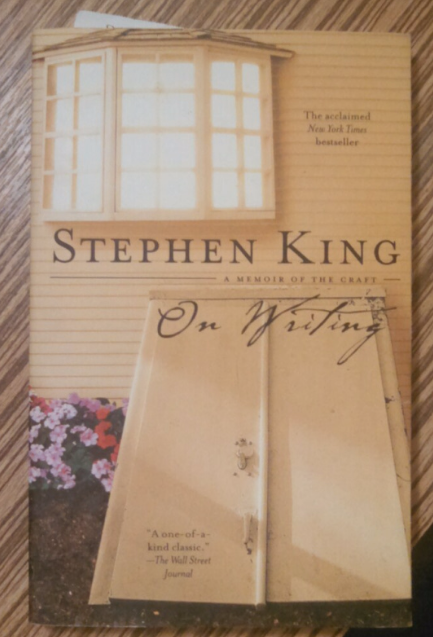 It’s important to study the masters in your field. And, in the world of writing, Stephen King is one of the all-time greats.
It’s important to study the masters in your field. And, in the world of writing, Stephen King is one of the all-time greats.
King’s sold over 350 million books, won more than 50 literary awards, and captured the American public’s imagination in ways that few other authors have ever been able to.
The man has put out dozens of classic stories which have become staples of pop culture. Even if you’ve never read a Stephen King novel, you’d still recognize some of these titles:
- It
- The Shining
- The Shawshank Redemption
- Misery
- The Dead Zone
- Carrie
- The Stand
- ‘Salem’s Lot
- Cujo
- The Green Mile
- Christine
- Children of the Corn
- The Running Man
- Firestarter
Recently, I decided to re-read King’s memoir, On Writing. While the whole book is fantastic, there were several stand-out pieces of advice worth sharing.
Below are five of Stephen King’s rules for success as a writer:
1. Practice Every Day
Everybody wants to be a writer, but nobody wants to sit down and actually do the work.
Writing, like weightlifting, revolves around gradual improvement. You can’t walk into the gym on your first day and expect to squat 315 pounds. Likewise, you can’t become a profession writer unless you spend a lot of time practicing.
Personally, I didn’t make a lot of money as a copywriter until I wrote one million words in a year (about 2,800 words per day).
That might sound like a lot of work, but it’s almost the exact amount of daily practice that King recommends. As he states:
I like to get ten pages a day, which amounts to 2,000 words. That’s 180,000 words over a three-month span, a goodish length for a book.
2. Experience Is The Best Teacher
Where do brilliant ideas come from?
It’s a question that’s fascinated some of the greatest minds, a mystery that many researchers have dedicated their entire lives to.
Whether you’re writing fiction, creating sales letters, or developing businesses, you need great ideas in order to survive. Without them you’ll fade into obscurity. Another faceless entity in the of mediocrity.
According to King, these ideas aren’t magic and they don’t appear out of thin air. They’re the results of your previous experiences.
Many of King’s books and stories were created by taking a real world incident and combining it with a little imagination. Graveyard Shift (a story about factory’s basement being full of giant rats) was inspired by King’s summer job, working at a factory with a basement full of giant rats.
Other stories, like Carrie and The Shining, were also the results of King taking events he’d experienced and adding in supernatural elements.
In the past I’ve suggested that experience is the best source for sales letter and non-fiction ideas. However, it was interesting to learn that successful authors use these same techniques.
3. Work For Someone Else When You’re Starting Out
If you want to be become a professional writer, get a job that pays you to write and provides you with feedback on what you’ve written.
King started writing his own stories in grade school. He’d pen “re-tellings” of popular horror movies and sell them around school for $0.25 per copy. And he’d also work with his brother to create newletters about local happenings.
However, King’s first writing breakthrough didn’t come until high school, when he got a job writing for the local paper. Working there, he received advice which helped shape his entire writing career:
When you write a story, you’re telling yourself the story. When you rewrite, your main job is taking out all the things that are not the story.
King’s part-time job at the local paper gave him the tools he’d later use to craft suspenseful page-turners that the public would gobble up.
When you start out as a writer, it’s a good idea to work for someone else. This way you can get feedback on what you’ve written, and learn the rules for creating content others will read.
Unfortunately, most people never do this.
With the explosion of Internet businesses and self-publishing, a lot of folks get so excited about creating blogs and eBooks that they never bother to learn the basics of good writing.
As a result, there are a lot of frustrated writers spinning their wheels as they work on sh*tty websites no one will read.
If you’re in college, get a job with the school paper. If you have a job, try doing some freelance writing on the side. You’ll make some extra money and get fantastic feedback for improving your craft.
4. Never Stop Reading

Many writers (especially on the Internet) fail because they can’t be bothered to pick up an actual book. As a result, they never get a glimpse of effective writing, forcing themselves to wallow in old tropes and wooden prose.
As King says:
If you don’t have time to read, you don’t have the time (or the tools) to write.
Expose yourself to new ideas. Go to the bookstore, buy 20 novels, and then sit down to read them all. Keep a notebook with you. Write down what did and didn’t work in each story, and keep track of any techniques you can incorporate into your own works.
Doing this gives you an education on all the greats (Hemingway, Chekhov, etc…), without having to shell out thousands of dollars for a literary masterworks at your local university.
5. Always Have A Side Hustle
You don’t become the sixth wealthiest author in the world (net worth $400 million) by random luck.
While On Writing isn’t a business book, it’s easy to read between the lines and see how King built himself up into one of America’s bestselling authors.
Despite having a full-time job teaching English, King used writing as a side hustle to get his family ahead. He’d pen short stories and sell them off for $200 apiece, using the money to buy groceries or pay off medical bills.
Once he was finished up with short stories, King would focus on writing novels. Selling the paperback rights to a single book paid up to $30,000, which was more than King earned in four years as an English teacher.
While many writers quit their craft as soon as they get a traditional job, King used his 9-to-5 to temporarily support himself while working towards his real goal, making it big as a professional author. The choice to focus on himself (rather than settling for a mundane but safe teaching job), made King one of the wealthiest authors alive, instead just being an anonymous English teacher trying to scrape by.
Writing is not a super strenuous task. You can have a job while penning articles, or working on a book, in your free time.
Take two or three hours each day and invest them into getting yourself ahead.
The time you spend working on your own projects pays off better than any traditional job. A few hours of daily effort is the difference between being trapped in a lifestyle you hate, versus having the financial freedom to do whatever you want.
P.S. Haven’t read On Writing yet? Well then…